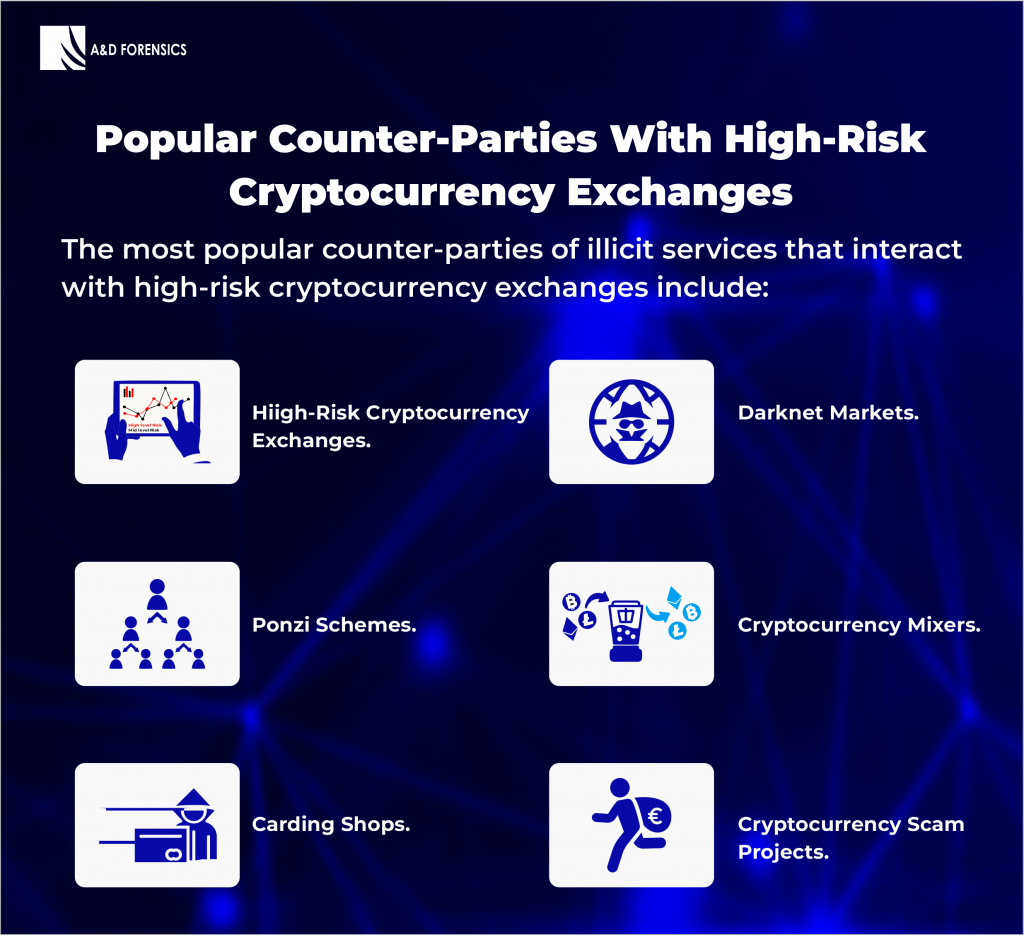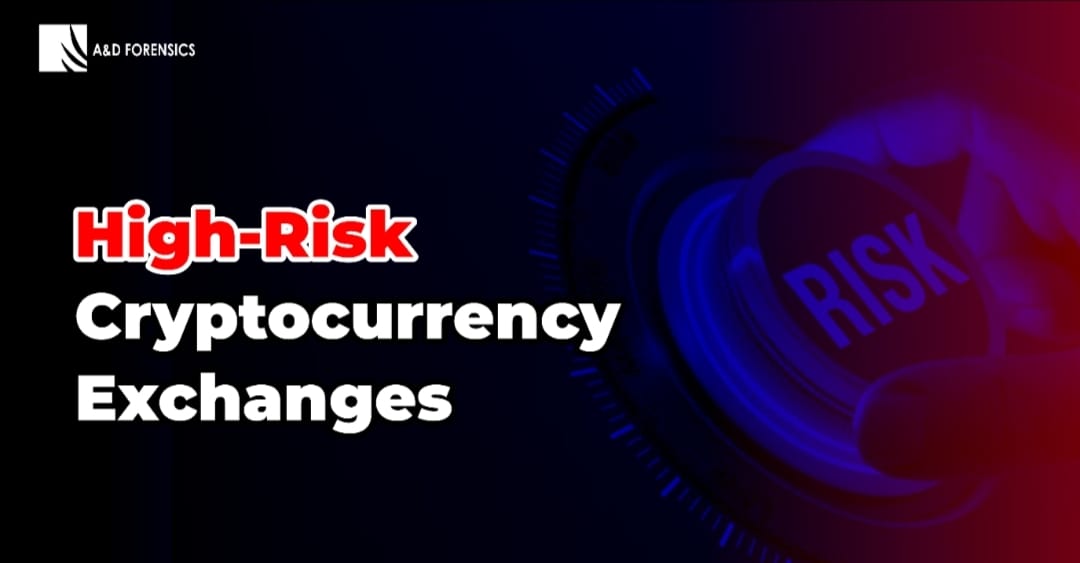High-risk cryptocurrency exchanges are exchanges with a high level of risk and few KYC requirements. They are more involved in illicit activities than low risk cryptocurrency regulated exchanges. Cryptocurrency Exchange risk has become unavoidable since the inception of digital currency.
CRYPTOCURRENCY EXCHANGES VS. TRADITIONAL STOCK EXCHANGES
The cryptocurrency exchanges differ from traditional stock exchanges in that the stock exchange market is supported by networks of brokerage firms that are strictly controlled by a central authority. However, the cryptocurrency exchange is instead centered around privately held exchanges with less regulatory requirements.
Customers on unregulated exchanges face entry barriers because fiat deposits are essentially only available for licensed exchanges. The unregulated exchanges only allow trade between cryptocurrencies, and they frequently replace fiat trading with stable coins like Tether. (Liljeström, 2019).
HOW ARE EXCHANGES CLASSIFIED AS HIGH-RISK CRYPTOCURRENCY EXCHANGES?
According to a 2020 report by Clain, it was shown that the share of illicit transactions in high-risk exchanges was 12 times higher than in regulated exchanges where the percentage of transaction volume from illegal transactions was 1.7% in 2020.
In addition, Chainalysis’s 2020 report also showed how BitMEX, a cryptocurrency exchange, and a derivative trading platform, once received a major blow from the Commodity Futures Trading Commission (CFTC). This was a consequence of not doing a proper licensing, hence, Chainalysis labeled them as a “high-risk exchange” at that time. However, in August 2021, Bitmex was able to clear their name out of the list after completing a comprehensive user verification programme with no KYC-free thresholds. The team also increased their partners to boost anti-financial crime, trade surveillance, and anti-money laundering capabilities.
For the above reasons, some Virtual Asset Service Providers (VASPs) are now being classified and addressed as High-risk exchanges, for not complying with the law.
WHAT ARE HIGH-RISK CRYPTOCURRENCY EXCHANGES?
High-risk cryptocurrency exchanges (HREs) are exchanges that require little or no user identity verification to transfer crypto-assets.
In other words, they are cryptocurrency exchanges that are characterised by a lack of transactional due diligence, lack of customer identity verification, and regulatory or legal compliance.
The ease of their services attract illicit agents such as drug marketplaces or phishers to their network. High-risk cryptocurrency exchanges are sometimes hosted on the dark web. They can also be located in nations with a reputation for public corruption, terrorism or weakened judiciaries.
POPULAR COUNTER-PARTIES WITH HIGH-RISK CRYPTOCURRENCY EXCHANGES.

The most popular counter-parties of illicit services that interact with high-risk cryptocurrency exchanges include:
- High-Risk Cryptocurrency Exchanges.
- Darknet Markets.
- Ponzi schemes.
- Cryptocurrency Mixers.
- Carding shops.
- Cryptocurrency scam projects.
Darknet Markets are the most popular counter-parties with high-risk cryptocurrency exchanges. A darknet market is a website that enables the exchange and sale of illegal products and services on the dark web. Examples: Hydra darknet market, Silkroad, Agora, Pandora. Hence, majority of funds flow from darknet market places to high-risk cryptocurrency exchanges.
Meanwhile, the dark web is an anonymous layer of the internet that may be accessed by networks like Tor (“The Onion Router”), I2P, and Riffle that use layered encryption to mask users’ identities.
9 COMMON CHARACTERISTICS OF A HIGH-RISK CRYPTOCURRENCY EXCHANGE
There are common characteristics that virtual asset service providers (VASPs) portray to be called high-risk cryptocurrency exchanges. Such as:
- High-Risk Cryptocurrency Exchanges do not comply with Anti-Money Laundering (AML) and Anti-Terrorist Financing regulations.
- They fail to register as money transmitting business or money service business (MSB).
- Know Your Customer (KYC) guidelines are not followed through in High-Risk Cryptocurrency Exchanges.
- When they try to adopt KYC guidelines, they don’t properly verify customers’ identity against fake credentials.
- They fail to prevent the creation and use of fraudulent accounts.
- They don’t file suspicious activity reports (SAR) or suspicious transaction reports (STR) when they occur in their exchanges.
- They interact and do business with sanctioned parties, entities and wallets. (OFAC, HM Treasury)
- They fail to respond to record requests from foreign law enforcement (MLAT)
- They also fail to respond to subpoenas and warrants during crypto-crime investigations.
VIRTUAL ASSET SERVICE PROVIDERS AND HIGH-RISK CRYPTOCURRENCY EXCHANGES
As a Virtual Asset Service Provider, Vasp, you are expected to comply with FATF Regulations. This simply keeps you safe and enables you to identify and avoid High-Risk Cryptocurrency Exchanges. The simplest way you can minimise your risk exposure is to have a robust compliance unit with efficient compliance specialists.
Your Compliance Officers are responsible for ensuring that all FATF Recommendations and other regulatory measures against money-laundering and terrorist financing are put in place within your platform.
Compliance Officers roles can be summarised into these three categories:
- Know your customer (KYC).
- Transaction monitoring.
- Responding to high-risk transactions.
CONCLUSION
In a nutshell, as a VASP do not evaluate compliance as expensive but as a money saver. The benefit includes gaining trust from your investors and platform users. In addition, having a compliance unit protects you from transacting with high-risk exchanges, hence avoiding penalties.
At A&D Forensics, we offer compliance services which includes compliance trainings for your compliance units. Also, if you would like to discuss a potential service from us you can contact us here.






